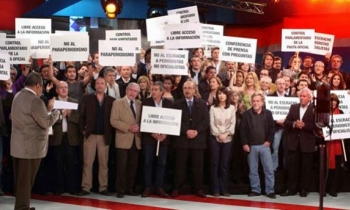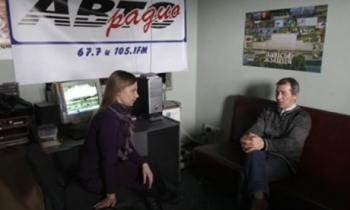PARIS: Western newspapers were split yesterday over caricatures of the Prophet Muhammad (pbuh), as several of Europe’s top dailies reprinted the cartoons but others argued that the defence of freedom of speech could not justify such offence to Muslims.
La Tribune de Geneve in Switzerland, France’s Liberation and Austria’s Die Presse all ran sketches of the Prophet, whose publication first in Denmark and then in European papers has set off a firestorm across the Muslim world.
Several or all of the cartoons also appeared this week in Germany’s Die Welt, France-Soir, two Hungarian papers and a Bulgarian daily.
But in Britain and the US, longstanding defenders of freedom of speech, papers on both the political left and right opted out, saying the images crossed the bounds of taste and good judgment.
Best-selling broadsheet the Daily Telegraph explained it preferred not to "cause gratuitous offence", and even the left-leaning Guardian said there were "limits and boundaries of taste, convention, principle or judgment" (see accompanying story).
"This is a clear example where people would find those offensive so we don’t see any particular reason to do it just for shock value," said Keith Richburg, the Washington Post’s foreign editor.
Peter Gavrilovich, foreign editor of the Detroit Free Press in Michigan, which has one of the largest Arab communities outside the Middle East, said it was out of the question for his paper to reprint the cartoons.
"I don’t think we would run a cartoon in this newspaper that would be deemed offensive to any religious figure," Gavrilovich told AFP. "We’re very careful in terms of any photo or any caricature that we run."
In Germany, the Frankfurter Rundschau concluded that the cartoons were defamatory and not worth defending.
"Whoever turns something like this into the salvation of freedom of the press ... is not really doing any favours to press freedom, because they are defending the misuse, rather than the sensible use, of press freedom," it wrote.
Like Britain’s Guardian and the Times, which printed a link to a website where the images can be seen, many papers weighed in to defend the right to free speech even while avoiding publishing the Prophet caricatures themselves.
But Spain’s centre-right El Mundo, quoting a French government statement condemning acts that "harm" religious beliefs, suggested that the West was ignoring its fundamental values in favour of accommodating Muslim cultural views.
Such reactions, it said, are "indicative of how fear of a violent response on the part of the Muslim world makes many people believe it is worth respecting their (Muslim) rules even at the expense of the erosion of ours."
Several papers including El Mundo compared the current controversy to the publication in 1989 of The Satanic Verses by British author Salman Rushdie.
"Can you imagine if in 1989, when Iran condemned Salman Rushdie to death for The Satanic Verses, one had questioned his right to write the book?" it wrote.
In Bulgaria, Novinar daily newspaper also reprinted the cartoons, while the Standart reprinted France-Soir’s cover from Wednesday which argues "Yes, we have the right to caricature God".
El Pais, also in Spain, picked up a French front-page item a cartoon from Le Monde published on Thursday.
France-Soir, whose Egyptian-French owner sacked the editor after the cartoons appeared in its pages, stressed in a message from the staff yesterday that free expression, not bigotry, was their motivation.
"Let us repeat again and again: there is absolutely no question ... of stigmatising Islam and Muslims. Religion is not the issue but intolerance," it said.









